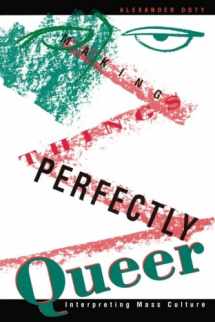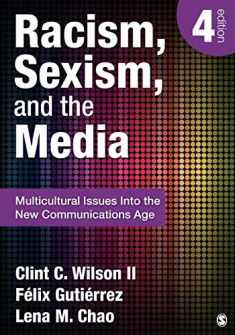
Making Things Perfectly Queer: Interpreting Mass Culture
ISBN-13:
9780816622450
ISBN-10:
0816622450
Edition:
First Edition
Author:
Alexander Doty
Publication date:
1993
Publisher:
Univ Of Minnesota Press
Format:
Paperback
168 pages
Category:
Popular Culture
,
Social Sciences
FREE US shipping
Book details
ISBN-13:
9780816622450
ISBN-10:
0816622450
Edition:
First Edition
Author:
Alexander Doty
Publication date:
1993
Publisher:
Univ Of Minnesota Press
Format:
Paperback
168 pages
Category:
Popular Culture
,
Social Sciences
Summary
Making Things Perfectly Queer: Interpreting Mass Culture (ISBN-13: 9780816622450 and ISBN-10: 0816622450), written by authors
Alexander Doty, was published by Univ Of Minnesota Press in 1993.
With an overall rating of 3.6 stars, it's a notable title among other
Popular Culture
(Social Sciences) books. You can easily purchase or rent Making Things Perfectly Queer: Interpreting Mass Culture (Paperback) from BooksRun,
along with many other new and used
Popular Culture
books
and textbooks.
And, if you're looking to sell your copy, our current buyback offer is $0.3.
Description
As a concept, "queerness" describes a cultural common ground between gays, lesbians, bisexuals, and other non-straights, but it also suggests a diverse and often uncategorizable cultural space that is everywhere in mass culture. Whether recognized or denied, queerness is an approach to mass culture that is shared by people with every kind of sexual self-definition. In "Making Things Perfectly Queer", Alexander Doty argues that films, television, and other forms of mass culture consistently elicit a wide range of queer responses, and suggests a framework for interpreting mass culture that stands as a corrective for many standard cultural approaches. Doty demonstrates how queer readings can be - and are - performed by examining star images like "Jack Benny" and "Pee-wee Herman", women-centered sitcoms like "Laverne and Shirley" and "Designing Women", film directors like George Cukor and Dorothy Arzner, and genres like the musical. In developing these readings, he suggests that queerness, not straightness, just might be the most pervasive sexual dynamic at work in mass culture production and reception.


We would LOVE it if you could help us and other readers by reviewing the book
Book review

Congratulations! We have received your book review.
{user}
{createdAt}
by {truncated_author}



